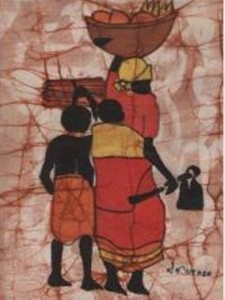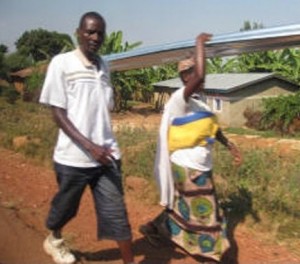The problems:
- disintegration of the family
- mistreatment of women and girls
- mistreatment of children
- witchcraft and cultural beliefs infiltrating the church
- despair of men who can no longer meet cultural definitions of masculinity
Over the last seven years, Empower has responded to leaders in the developing world who are searching for solutions to the disintegration of the family, and its impact not only on individuals who are hurt, abused, or neglected, but on the society as a whole, which begins to fall apart.
The patterns of dysfunction have a long history. This painting from Uganda depicts “The African Woman’s Burden,” a common art theme in sub-Saharan Africa, where women do the bulk of the farming.
 The hoe and the produce-laden basket on the woman’s head tell us that she is on her way home after a long day in the fields. The firewood carried by the girl-child reminds us of the many hours that women spend cooking that food. In some versions of this image, the woman is clearly pregnant as well. This and the baby on her back symbolize the many children she will be expected to bear. Bare feet suggest her poverty.
The hoe and the produce-laden basket on the woman’s head tell us that she is on her way home after a long day in the fields. The firewood carried by the girl-child reminds us of the many hours that women spend cooking that food. In some versions of this image, the woman is clearly pregnant as well. This and the baby on her back symbolize the many children she will be expected to bear. Bare feet suggest her poverty.
Such art reflects real life, as this photo taken along the road in Burundi shows. Inside the wrap around the woman’s middle is a baby. She may be pregnant as well. The man is wearing Western clothes and shoes; the woman is wearing traditional clothes and flip-flops. She carries roofing metal on her head, while her man holds nothing more than a pen.
The problems women face in developing countries are only the most visible symptoms of a wider dysfunction. Men also carry an unseen unburden, as economic development and the absence of jobs strip them of the means of supporting a family, and with that, their traditional role. The result: many fall into patterns of violence, substance abuse, and despair.
Unlike many of the problems in the world, much family dysfunction can be solved through education and attitude change. Empower International Ministries provides such training in Africa, India, and Haiti, healing family and community brokenness through programs promoting forgiveness, self- and mutual respect, and compassion.
Bible study may seem like a low priority for a continent wracked by ethnic violence, poverty, and rape used as a weapon of war. Our experiences there, however, tell us that such evils will not be eliminated without the personal and cultural transformation wrought by the Word of God.
Interestingly, the transformation comes not because our African partners do not know the Bible. Not only the clergy, but many of the lay people with whom we work, know the Bible better than the average American Christian. They also take it far more seriously. Rather, the surprises come because Africans, like many of us, were taught to read the Bible through the lens of gender bias. Our job at Empower is to rid us all of those distorted glasses.
For example, many African Christians have been taught, and firmly believe, that in Genesis 3, God cursed the woman. This is a powerful influence on their society and relationships within it.
In many societies, people believe that “a curse” will always come true. If a father tells his child, “You will never amount to anything,” or someone hires a witchdoctor to curse a neighbor whom he envies or dislikes, everyone expects those cursed to sicken, lose their possessions, fail their exams, and otherwise fall apart.
So when Genesis 3:16 is believed to be a curse from God, women appear doomed to fulfill its words: Woman must bear children in sorrow, serve the man, and become his sexual property. Further, being cursed means that woman no longer shares in the blessings given to both man and woman in Genesis 1–dominion over the earth and every good thing for food. If any particular woman has access to more than the necessities of life, it is entirely at the pleasure of her husband. But how hard should men work to increase the welfare of women when even women believe that God has cursed them?
When these Bible-believing Christians attend our seminars, and study the Scriptures anew to find that the text actually says that only the ground and serpent, not the woman, are cursed, they are astonished. They also discover together other surprising truths, such as:
- God blessed woman equally with man with dominion of the earth (Genesis 1:28).
- Jesus taught that woman’s worth transcends her customary functions of child bearer (Luke 11:27), household servant (Luke 10:38-41), and sexual property of men (Luke 7:38-48 and others
- Husbands are commanded to love their wives and sacrifice themselves for them, not to rule them or use them as beasts of burden (Eph. 5:25-33).
- Jesus frees men from the burdens of seeking to dominate each other (Mark 10:41-45)
As they study with us and discover these truths, we see immediate change in their attitudes and relationships.
One graduate in Kenya wrote: “I used to see my wife as just a worker in our family. I did not even sit to eat with her from the same table. After attending the Empower conference, things have changed. My wife is now a companion. We eat together, we sit and talk, and life is so good in our family.”

